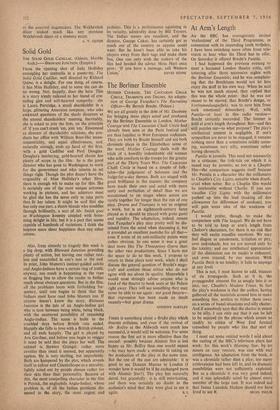Solid Gold
THE SOLID GOLD CADILLAC. (Odeon, Marble Arch.)---BHOWANI JUNCTION. (Empire.) FROM the opening shot of Judy Holiday entangling her umbrella in a passer-by, The Solid Gold Cadillac, well directed by Richard Quine, is a delight. For one thing, of course, it has Miss Holiday, and to some she can do no wrong. Nor, happily, does she here. This is a story trimly tailored to her blend of cru- sading glee and soft-hearted sympathy : she is Laura Partridge, a small shareholder in a large, glittering American company, who asks awkward questions of the shady directors at the annual shareholders' meeting. Inevitably, she is asked to join the firm, on the principle of 'if you can't crush 'em, join 'em.' Ensconced as director of shareholder relations, she con- ducts her office with William Boot-like incon- sequentiality, and equal effectiveness, and. naturally enough, ends up head of the firm, with a gold Cadillac and Paul Douglas. Douglas's lumbering, gold-hearted charm has plenty of scope in the film : he is the good director who has gone to Washington to work for the government and who returns to set things right. Though the plot doesn't have the originality of Miss Holliday's other films, there is enough wit to make up for this. She is certainly one of lie most unique actresses working in pictures, and her admirers must be glad she has the sense only to take parts that, fit her talent. It might be said that she has only one part, a dumb blonde who muddles through brilliantly, a sort of Mr. Smith goes to Washington honesty coupled with brim- ming delight in life; but it is a part that seems capable of hundreds of variations. I think she inspires more sheer happiness than any other actress.
Alas, from comedy to tragedy this week is a big drop, with Bhowani Junction providing plenty of action, but leaving one rather rest- less and unsatisfied in one's seat at the end. In print, John Masters's instinct-guided sahibs and Anglo-Indians have a certain ring of truth; anyway, too much is happening in the rape or flogging line to allow the reader to bother much about abstract questions. But in the film, all the problems loom with forbidding fre- quency, until one begins to think that the Indians must have read John Masters too. If anyone doesn't know the story, Bhowani Junction is the tale of an Anglo-Indian girl who is torn between being white, being black, with the unuttered possibility of remaining Anglo-Indian. The scene is India in the troubled days before British rule ended. Happily she falls in love with a British colonel. and all ends happily. The girl is played by Ava Gardner, and before you begin to snigger it must be said that she plays her well. The colonel is Stewart Granger. rather more cavalier than usual it seemed, but apparently ageless. He is very sterling, but improbable. Both are hampered by the plot, which reveals itself in colour and CinemaScope as a morality, lightly acted out by people chosen rather for their skin than their personality. Because of this, the most compelling character in the film is Patrick, the anglophile Anglo-Indian, whose problem is, of all the Indian problems dis- cussed in the story, the most cogent and
pathetic. This is a performance agonising in its veracity, admirably done by Bill Travers. The Indian scenes are excellent, and the director, George Cukor, has certainly got as much out of the country as anyone could want. But he hasn't been able to take his players away from their tags and make them live. One can only wish the makers of the film had heeded the advice Moss Hart once gave: 'If you have a message, call Western


































 Previous page
Previous page